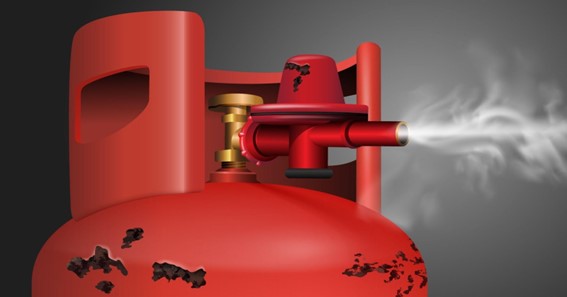Picture this: you’re at home, preparing a delicious meal for your loved ones, when suddenly you catch a whiff of something peculiar. It’s that distinct smell of rotten eggs. Panic sets in as you realize it could be an LPG leak.
Now, I know what you’re thinking. What’s so dangerous about a little gas leak? Hold your oven mitts because the consequences can be explosive. LPG, a highly flammable fuel commonly used for heating, cooking, and even fueling vehicles, poses a significant risk if it leaks. The gas, denser than air, can accumulate in enclosed spaces, waiting for the right spark to ignite a fiery inferno.
But don’t let the danger discourage you from enjoying the comforts of modern life! Understanding the signs and taking preventive measures can keep you safe. You can also visit https://plusgas.com.au/ for recommendations and expert advice on properly handling gas leaks and storing LPG.
How to Identify a Gas Leak
1. Sniff for the Stink
Your nose knows! One of the most common ways to identify a gas leak is by detecting a distinctive odour reminiscent of rotten eggs. Gas companies add a mercaptan chemical to the odourless gas, giving it a pungent smell that’s hard to miss. So, if this foul fragrance suddenly assaults your nostrils, it’s time to investigate.
2. Listen for Hissing Sounds
Gas leaks sometimes manifest as hissing or whistling sounds near gas pipes or appliances. Imagine a sneaky serpent trying to give away its presence. If you hear such suspicious serenades, especially in areas where gas is used, it’s worth investigating further.
3. Keep an Eye on Dead Vegetation
Plants are nature’s silent witnesses. It could indicate a gas leak if you notice dead or discoloured vegetation near your gas lines or appliances. Gas escaping from underground pipes can affect plant health, causing them to wither and die. So, the next time you encounter an eerie plant graveyard, consider a gas leak a potential culprit.
4. Look for Bubbling Water
Gas leaks underground can infiltrate water sources, leading to bubbles or unusual disturbances on the surface. If you see bubbling or unexplained turbulence in ponds, puddles, or ditches near gas lines, it’s a red flag that demands your attention. Nature’s aquatic alarm system is at work!
5. Check for Persistent Headaches or Dizziness
Gas leaks can have adverse health effects. If you or your family members experience unexplained and persistent headaches, dizziness, or nausea while at home, it’s wise to consider the possibility of a gas leak. Remember, your body might be trying to warn you when your senses fail.
6. Notice Sudden Fatigue or Weakness
Feeling like you’ve run a marathon when you’ve barely lifted a finger? Gas leaks can deplete the oxygen in the air, leading to feelings of fatigue or weakness. Don’t blame your exercise routine if you find yourself inexplicably drained in your home. Investigate the possibility of a gas leak.
7. Pay Attention to Respiratory Issues
Inhaling gas can irritate your respiratory system, causing coughing, wheezing, or difficulty breathing. If you or your loved ones experience sudden or unexplained respiratory issues within your living space, it’s crucial to consider a gas leak as a potential culprit. Catching your breath takes on a whole new meaning.
8. Watch for Flames or Sparking
Here’s a tip that can save lives! If you notice flames or sparking near a gas appliance or line, it’s an immediate cause for concern. A gas leak combined with an open flame or a spark can lead to a catastrophic fire or explosion. Remember, fire and gas don’t make a nice duet.
9. Use Gas Detector
Technology to the rescue! Gas detectors are reliable gadgets that can sense the presence of gas in the air, alerting you with an alarm or visual indication. Equipping your home with a gas detector can provide an added layer of safety, like a trusty sidekick that never sleeps.
10. Keep Tabs on Gas Meter Readings
Monitoring your gas meter readings can provide valuable insights. If you notice an unexpected increase in gas consumption despite your usage habits remaining the same, it could indicate a gas leak. A vigilant eye on those digits might reveal a hidden culprit.
Click here – 13 Ways to Keep Bugs Out of Your Garden
Why is it important to identify a gas leak?
Identifying a gas leak is of utmost importance for the following reasons:
- Personal Safety: By promptly identifying a gas leak, you can immediately mitigate the danger, protecting yourself and others from potential harm.
- Health Hazards: Inhaling gas can lead to respiratory issues, headaches, dizziness, nausea, or even unconsciousness. Identifying leaks can prevent health hazards and ensure a safe living environment.
- Property Protection: Even if the gas does not ignite, prolonged exposure to the gas can corrode pipes, appliances, and infrastructure, leading to costly repairs. Early detection helps prevent property damage and preserve the investments you’ve made in your home.
In summary, identifying a gas leak is crucial for personal and community safety. It allows timely intervention, preventing potential disasters and creating a secure and healthy living environment.
For more comprehensive gas leak advice and reliable LPG bottles, consult Plus Gas Brisbane today!
